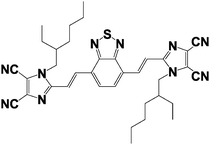Solution processable bulk-heterojunction solar cells using a small molecule acceptor†
Abstract
We report a small-molecule electron-acceptor based on

Maintenance work is planned for Wednesday 1st May 2024 from 9:00am to 11:00am (BST).
During this time, the performance of our website may be affected - searches may run slowly and some pages may be temporarily unavailable. If this happens, please try refreshing your web browser or try waiting two to three minutes before trying again.
We apologise for any inconvenience this might cause and thank you for your patience.
* Corresponding authors
a Institute of Materials Research and Engineering (IMRE) and the Agency for Science, Technology and Research (A*STAR), 3 Research Link, Singapore, Republic of Singapore
b Dept. of Chemistry, Imperial College London, Exhibition Road, South Kensington, London, UK
c Merck KgaA, Frankfurter Strasse 250, Darmstadt, Germany
d
Center for Advanced Molecular Photovoltaics (CAMP), Geballe Laboratory for Advanced Materials, 476 Lomita Mall, Stanford University, Stanford, CA, USA
E-mail:
aselli@stanford.edu
e Max Planck Institute for Polymer Research, Ackermannweg 10, Mainz, Germany
We report a small-molecule electron-acceptor based on

 Please wait while we load your content...
Something went wrong. Try again?
Please wait while we load your content...
Something went wrong. Try again?
Z. E. Ooi, T. L. Tam, R. Y. C. Shin, Z. K. Chen, T. Kietzke, A. Sellinger, M. Baumgarten, K. Mullen and J. C. deMello, J. Mater. Chem., 2008, 18, 4619 DOI: 10.1039/B813786M
To request permission to reproduce material from this article, please go to the Copyright Clearance Center request page.
If you are an author contributing to an RSC publication, you do not need to request permission provided correct acknowledgement is given.
If you are the author of this article, you do not need to request permission to reproduce figures and diagrams provided correct acknowledgement is given. If you want to reproduce the whole article in a third-party publication (excluding your thesis/dissertation for which permission is not required) please go to the Copyright Clearance Center request page.
Read more about how to correctly acknowledge RSC content.
 Fetching data from CrossRef.
Fetching data from CrossRef.
This may take some time to load.
Loading related content
